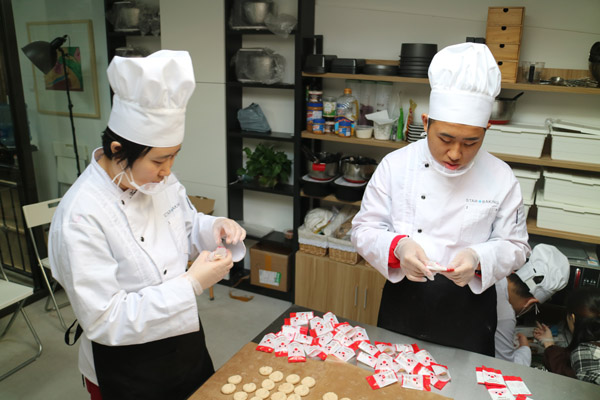Independent goals


Sheltered employment
A bakery on the studio's second floor teaches adults with autism how to make pastries for free.
Zhou says they plan to turn the bakery into a sheltered workshop that not only ensures incomes for people with autism but also protects them from the outside world.
"They're like people who never grow up and don't know social conventions," Zhou says.
"They feel safe in their comfort zones and adhere to strict routines. That's why we want to shelter them."
The bakers went to Beijing's Grand Summit to sell cookies and products printed with paintings every week, with assistance from full-time teachers and volunteers.
"We encourage them to work within their capabilities, enabling them to earn money in a respectable way," says Guo Ying, a full-time teacher in the studio.
"They can also learn how to interact with others in society by talking with customers."
People with autism need lifelong care and protection, Zhou says.
"I hope the government can develop solutions to guarantee their wellbeing without us guardians."
The group plans to make the bakery a model and figure out how much it costs to run.
"The government will notice and know how to help us."
Job option
Though sheltered employment is a good option for families who want their children to be protected in workplaces, some parents hope their children can function in ordinary workplaces and explore their potential to engage the outside world.
China's government and NGOs practice supported employment, which gives people with disabilities employment opportunities to work with peers who don't have disabilities through vocational rehabilitation and job coaching.
The country plans to cultivate 2,500 job coaches for supported employment by 2020, according to China's 13th Five-Year Plan (2016-20).
The NGO Rong Ai Rong Le has been developing supported employment since 2013.
The organization first assesses candidates' emotional stability and communication ability to see if they're suitable, project manager Qu Zhuo explains.
"About a third of people with autism are appropriate for the program," Qu says.
"Coaches give one-on-one instruction in vocational skills, social propriety and self-care."
Coaches then follow them on the job for months to make sure they can handle the work.
"The whole process averages a year," Qu says.
"So far, 37 trainees with disabilities have signed contracts with companies."
The Beijing-based NGO founded by parents of children with intellectual and development disabilities is a pioneer of supported employment in China.
"We're striving to give these vulnerable groups a fair chance in the workplace," Qu says.




































